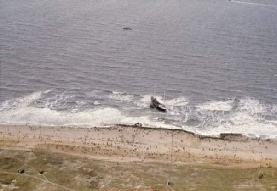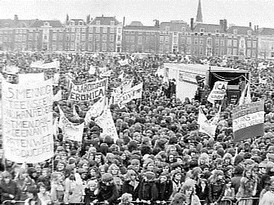© 2014-


Radio Veronica - 1970’s History (6)
On the morning of 3rd April 1973 Radio Caroline's owner, Ronan O'Rahilly, contacted Radio Veronica and offered the use of the Mi Amigo as a temporary base for the stranded Dutch station. The owners of RNI made a similar offer of assistance, offering a spare transmitter on the Mebo II.
From Radio Veronica's point of view it was particularly important that the station returned to the air as quickly as possible. A mass rally had been arranged in The Hague for 18th April 1973 to coincide with a Parliamentary hearing on the proposed anti-
Salvage contractors worked for days trying to re-
At Radio Veronica's expense the Mi Amigo’s generators were repaired, studio equipment overhauled and a new temporary aerial erected. By 9.00am on 11th April 1973 test transmissions began, with regular Radio Veronica programmes from the Mi Amigo starting at 12 n oon.
oon.
It was not until a week later that the Norderney was finally re-
The Dutch Parliament considered the question of offshore radio again in June 1973. During the course of the debate it became clear that one of the largest political groups were to support the Government proposals and this effectively meant that the legislation would be passed.
The Dutch Parliament was also against Radio Veronica's request to be allowed a separate wavelength -
On 28th June 1973, following a three day debate, the Lower House of the Dutch Parliament voted in favour of ratifying the Strasbourg Convention and in favour of the Bill to outlaw offshore radio stations although the legislation still had to be passed by the Upper Chamber.
VOO had attracted over 100,000 members by the end of July 1973 which clearly qualified it for a ‘C’ status airtime allocation on the Hilversum Network. But on 8th August 1973 Minister of Culture, Henri van Doorn, announced that while consideration would be given to VOO the actual number of members would have to be ratified.
The Minister subsequently made various administrative changes to the qualifying rules for calculating the number of broadcasting organisation members and ultimately ruled that a 'member' must have registered using their full name -
However, the Government now argued that, despite meeting the qualification requirements for broadcasting status, Veronica could not be allowed to join the Hilversum network because Hilversum 3 already provided an adequate pop music service. Radio Veronica also made an appeal to the Government for a six month delay in the implementation of the new Dutch Marine Offences Act, but this was refused.
At the beginning of December 1973 Radio Veronica was forced to suspend its 24hour weekend service and later in the month to end all weekday transmissions at midnight. This situation had been brought about because of the oil crisis facing the West in late 1973 as the result of embargoes placed on supplies by Arab oil producers.

Rally supporting Radio Veronica in The Hague, 18th April 1973

Click on picture to enlarge
History
Key Dates
Ships and Location
Technical
Staff
Programmes






Treasure Chest

Norderney being re floated, 18th April 1973

Back to Netherlands/Belgium Gallery


Back to Radio Veronica
